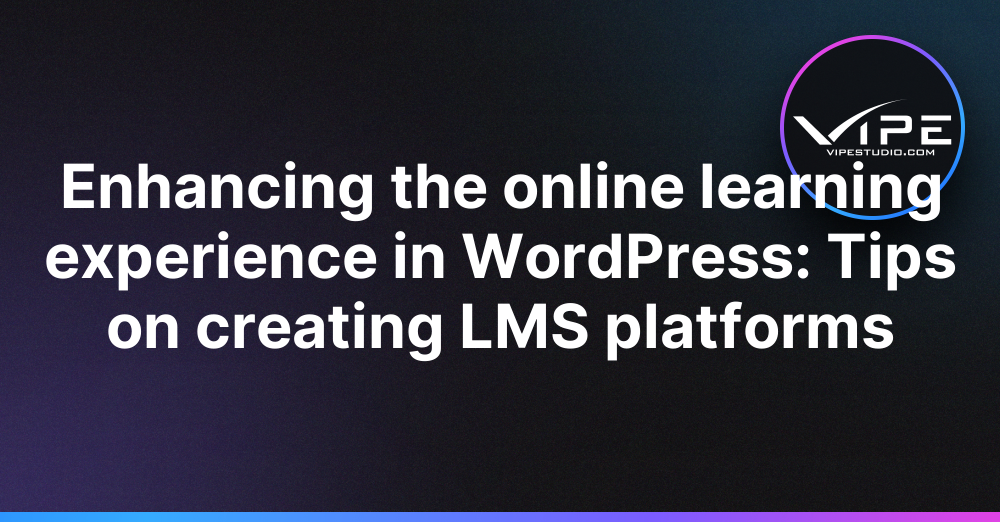29.05.2023
WordPress Development
Enhancing the online learning experience in WordPress: Tips on creating LMS platforms
READING TIME: MIN
Table of Content
With the increasing popularity of online learning, many businesses and educational institutions are turning to Learning Management Systems (LMS) to deliver courses and training programs. LMS platforms allow educators to create and manage course content, track student progress, and provide assessments and certifications. With its flexibility and scalability, WordPress has emerged as a popular platform for creating LMS platforms. In this article, our Enterprise WordPress Agency for Development team will discuss tips on how to enhance the online learning experience in WordPress by creating effective LMS platforms.
Choose the right LMS plugin
According to our experts at Enterprise WordPress Agency for Development, the first step in developing an efficient LMS platform in WordPress is to select the appropriate LMS plugin. There are various WordPress LMS plugins available, each with its unique set of features and functions. When selecting an LMS plugin, keep your unique needs and requirements in mind, such as the sort of content you’ll be delivering, the amount of customisation you need, and the capabilities you’ll need to measure student progress.
LearnDash, LifterLMS, and WP Courseware are some prominent WordPress LMS plugins. These plugins provide:
- Course design and management.
- Student monitoring and reporting.
- Connectivity with payment systems and third-party resources.
Create engaging course content
Developing compelling course material is essential for improving the online learning experience with WordPress. While creating course content, keep your target audience and their learning styles in minSome learners, for example, may prefer visual content like movies or infographics, whilst others may prefer textual content or interactive tasks.
It is also critical to arrange course information such that it is simple to explore and understanLearning may be kept interested and motivated by breaking text down into smaller chunks and utilizing clear headers and subheadings.
Use multimedia elements
Using multimedia features like movies, photos, and interactive activities may assist in improving the online learning experience in WordPress. These aspects can assist students in understanding complicated concepts, visualizing ideas, and remaining interested in course content.
It is critical to include multimedia components that are related to the course material and do not distract learners from the key objectives. Employing too many multimedia components can potentially slow down website load times, affecting user experience.
Provide assessments and feedback
Assessments and feedback are critical components of any LMS platform because they allow learners to track their progress and discover areas for growth. It is critical to ensure that assessments are connected with course goals and offer learners with a clear sense of their performance while developing them.
Giving evaluation comments can also improve the online learning experience with WordPress. Constructive feedback should give learners concrete measures to enhance their performance.
Offer social learning opportunities
It is possible to improve the quality of the WordPress online learning experience by providing chances for social learning, such as discussion boards or comments from one user to another. Learners are given the opportunity to connect with one another, discuss ideas, and work together on material covered in the course by virtue of these chances.
While providing chances for social learning, it is crucial to set clear standards and expectations for the expected level of engagement. In addition to this, ensuring a pleasant and productive learning atmosphere by moderating comments and offering feedback may be of great assistance.
Integrate with third-party tools
Connecting with third-party technologies in WordPress, such as payment gateways or learning analytics systems, can help improve the quality of the WordPress-based online learning experiencThese interfaces have the potential to provide learners a seamless experience while also enabling instructors to monitor the development and performance of their students.
When connecting with third-party tools, it is essential to verify that such tools are compatible with the plugin for your learning management system (LMS) and that they offer the features and functions that are necessary for your organization.
Need help creating LMS platform?
Are you looking for an Enterprise WordPress Agency for Development to help you develop an LMS platform? Look no further than our Enterprise WordPress Agency for Development! We are a team of experienced WordPress developers who can help you create a powerful and scalable LMS platform.
We have extensive experience in developing LMS platforms using WordPress and can tailor the platform to your specific needs. We can also integrate it with other third-party applications and services.
If you need help in creating an LMS platform, contact our Enterprise WordPress Agency for Development today and we will be glad to assist you.
Conclusion
Enhancing the online learning experience in WordPress can be a great way to boost your business. With the right tools and strategies, it’s possible to create an effective Learning Management System (LMS) platform that will help you deliver high-quality eLearning content to your students.
More on The Topic
- Leveraging WordPress REST API: Transforming Data Handling
- Navigating WooCommerce Performance: Real-World Strategies
- The Role of AI in WordPress Development Workflows
- Optimizing WordPress for Enterprise: Beyond Basic Caching
- WordPress and Headless Commerce: A Provocative Dilemma
The content of this website is copyrighted and protected by Creative Commons 4.0.



